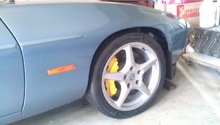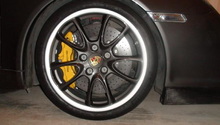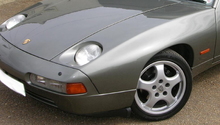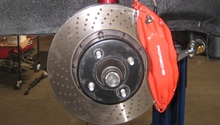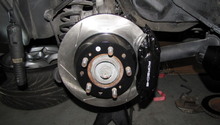Porsche 993: Why Do My Brakes Squeak?
Squeaking brakes are never a good sign, but they don't always mean a part is failing. Most brakes squeak for one of a few common reasons, and fortunately these reasons are easy to diagnose and resolve.
This article applies to the Porsche 993 (1993-1998).
Diagnosing why your brakes squeak is sometimes difficult. Your brakes could squeak because of something as innocent as clogged rotor holes, or because you've worn down your pads and need to replace them. Replacing brake pads is relatively simple but may not be the first thing you want to do. Instead, consider checking for clogged rotor holes. Also, if you've recently replaced your brake pads – or if your car is new – your brakes could squeak because they haven't fully bedded the pad material onto the rotor. Resolving this issue is as simple as taking your car for a high-speed ride. Here are a few things to help identify why your brakes squeak and resolve the issue.

Materials Needed
- Jack
- Jack stands
- Lugnut wrench
- Vise grip pliers
- Flathead screwdriver
- Brake pads
- 10mm hex socket wrench
- C-clamp
- Towels
- Phillips screwdriver
- Impact screwdriver
- High-temperature anti-squeal grease
Replace Brake Pads
Worn brake pads can cause your brakes to squeak and possibly fail under certain conditions. If your brake pads are under 3mm, it's definitely time to change them. Expect to pay between $30 and $150 for new pads, depending on the brand you buy. A mechanic will charge you for the parts and labor, and it can cost between $300 and $500. Even a novice car owner can replace brake pads, as long as he's comfortable removing several types of connectors and willing to get a little dirty. Be sure to change pads on front and rear brakes at the same time.
- Put the car on jack stands.
- Use lugnut wrench to remove wheel.
- Slide the holder down first to remove brake pad sensor wire from holder.
- Squeeze the center of the brake pad retainer with vise grip pliers.
- Pry up retainer with flat head screwdriver. Remove sensor wires and unplug from terminal.
- Remove two mounting screws with 10mm hex socket wrench.
- Remove brake lines from strut. Place brake line out of the way. Be careful not to damage it or cause it to kink.
- Remove the brake caliper.
- Use C-clamp to squeeze pistons back. This gives you enough room to install new brake pads.
- Remove brake pads from calipers. Use a flathead screwdriver to pry pads away from pistons if necessary. You may cause some brake fluid to spill at this stage, so have towels available just in case.
- Use Phillips screwdriver to remove the two screws holding the rotor in place. You may need to use an impact screwdriver to remove screws that have rusted into place.
- Remove rotor.
- Replace brake pads. Consider using high-temperature anti-squeal grease to help prevent your brakes from squeaking. Be sure not to get grease on the working surface of the pads and rotor.
- Put rotor back on and attach with two screws. Reattach brake caliper. Replace brake lines into strut. Replace two mounting screws, put retainer back into place, and reattach sensor wires. Plug it back in. Replace sensor wire in holder. Put wheel back on. Lower your car. To help push pads flat against the rotors, before taking your car for a spin, pump your brakes a few times. Skipping this step could cause your pedals to go right to the floor the first time you need to brake.
Related Articles:
- How to Jack Up Your Porsche - Rennlist.com
- Porsche 997: How to Replace Brake Pads/Calipers/Rotors - Rennlist.com
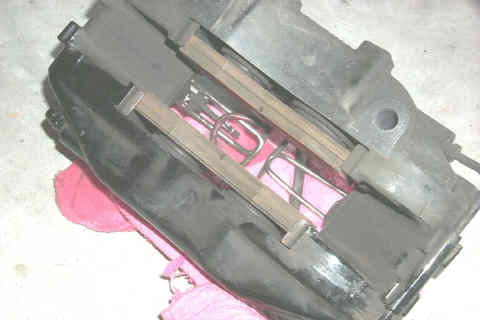
Figure 1. Brake caliper with pads. 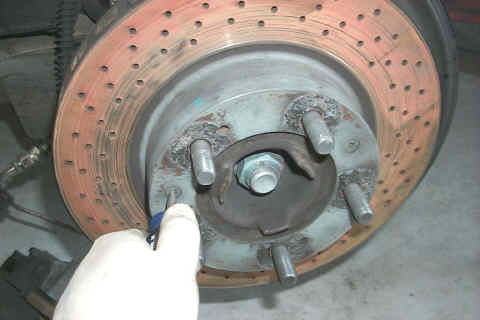
Figure 2. Rotor.
Apply High-Temperature Anti-Squeal Grease
Friction between the edges of the brake pads and the brake caliper and caliper pistons can cause your brakes to squeak. Applying a high-temperature anti-squeal grease when replacing brake pads can help eliminate the squeak, but be sure not to get any on the working surfaces of the pads and rotor.
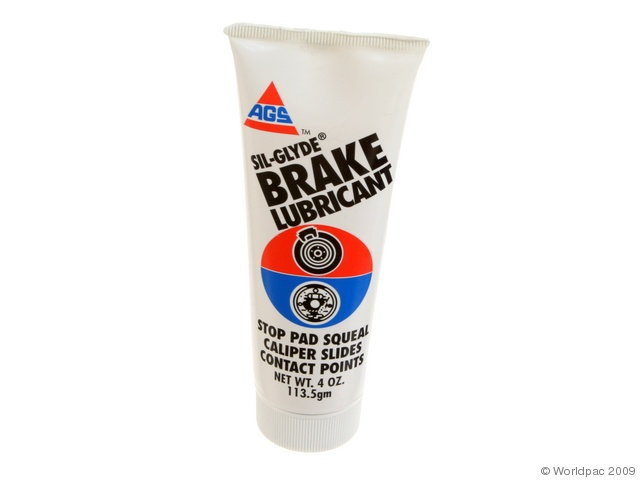
Remove Built-up “Glaze”
Driving and braking slowly can cause brakes to become “glazed” over time, which can cause your brakes to squeak. One way to eliminate this squeak is by helping the pad and rotor seat better together. To do this:
- Find a road where no one is around. An empty parking lot will work, too.
- Drive your car until you’re going 50 MPH.
- Stomp on the brakes until you almost stop, then release the brake and drive your car to 50 MPH.
- Repeat Step 3 between three and five times.
- Drive your car until you’re going 40 MPH.
- Stomp on the brakes until you almost stop, then release the brake and drive your car to 40 MPH.
- Repeat Step 6 between three and five times.
- Drive your car until you’re going 60 MPH.
- Stomp on the brakes until you almost stop, then release the brake and drive your car to 60 MPH.
- Repeat Step 9 between three and five times.

Check For and Clean Out Clogged Rotor Holes
Some 993 owners report that brake dust in the rotor holes can cause the brakes on the 993 to squeak. To clean:
- Take your car to a car wash.
- Spray high-pressure steam into the holes in the rotor.
- Roll the car forward about an inch, or as far as you need to expose the part that the caliper hides, and spray high-pressure steam into these holes.
- Use screwdriver to unplug the holes if they’re really clogged.
- Drive car. If this resolved the problem, then you shouldn’t hear the squeak.
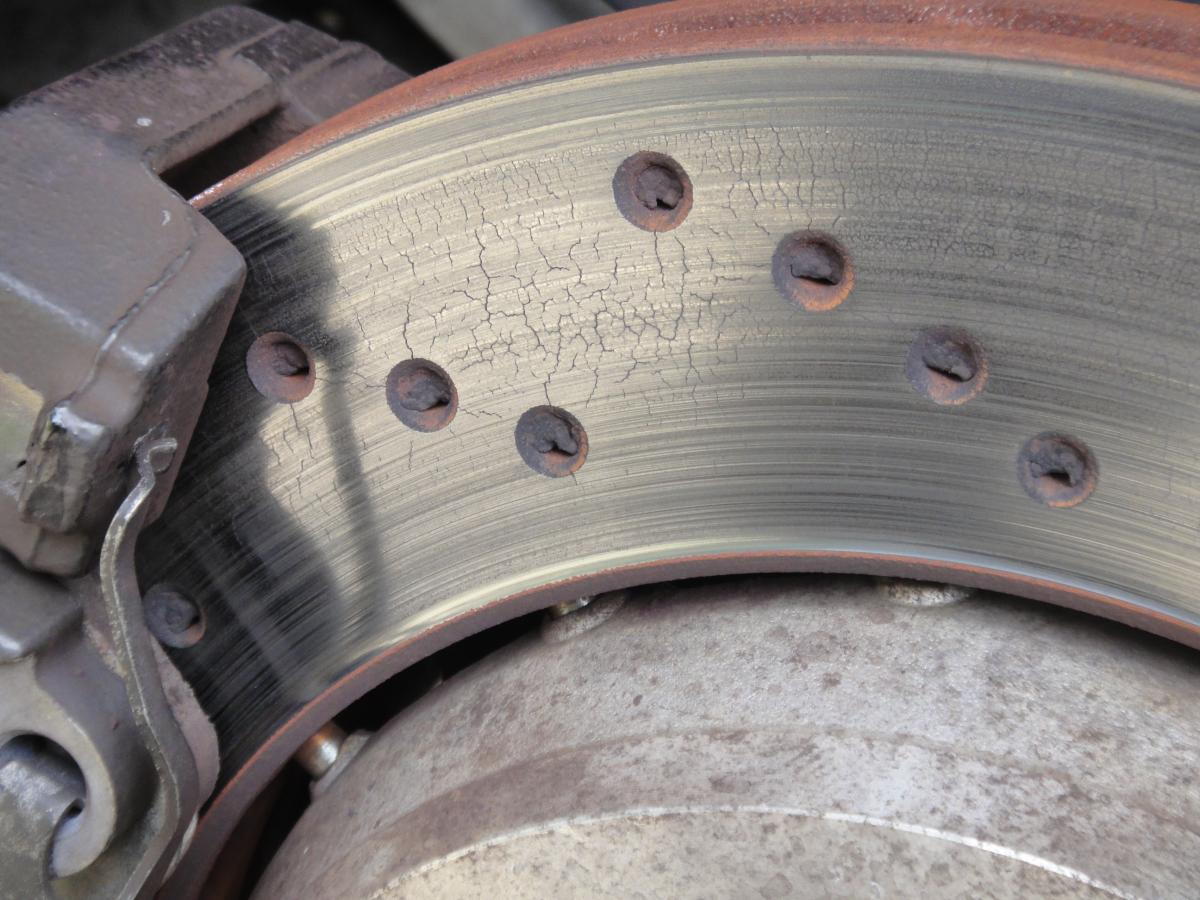
Related Discussions
- Squeaking Brakes - Rennlist.com
- Brakes Squeal Like a Pig - Rennlist.com
- Annoying Constant Brake Squeal Until I Brake - Rennlist.com
- Squealing Brakes - Rennlist.com

